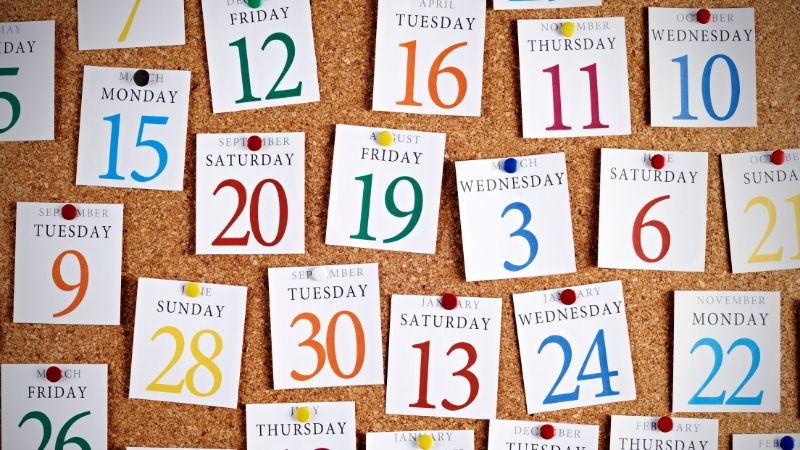Have you ever wondered how to say the days of the week in Korean? Learning a new language can be exciting, especially when you discover how different words are formed.
When I started learning Korean, I found it fascinating that each day is named after an element, like the moon, fire, or water.
In this article, you will learn Korean days of the week and what they actually mean. By the end, you’ll be ready to use Korean days when scheduling a meeting with your Korean friends!
- Chuseok Guide For Foreigners
- My Daegu’s Chimaek Festival Experience
- Korean Beauty Standards

What Are Days Of The Week In Korean?
Here are the days of the week in Korean:
- Monday (월요일) - Wollyoil
- Tuesday (화요일) - Hwayoil
- Wednesday (수요일) - Suyoil
- Thursday (목요일) - Mokyoil
- Friday (금요일) - Geumyoil
- Saturday (토요일) - Toyoil
- Sunday (일요일) - Ilyoil
Read Also:

Breakdown Of The Days Of The Week In Korean

Each day of the week in Korean not only tells you which day it is but also carries a deeper meaning related to nature and traditional beliefs!
1. Monday (월요일 - Wollyoil)
Breakdown of the word: 월 (Wol) means "moon."
Meaning: Monday is often seen as the start of the week, reflecting the calm and quiet energy of the moon.
2. Tuesday (화요일 - Hwayoil)
Breakdown of the word: 화 (Hwa) means "fire."
Meaning: Tuesday is associated with energy and enthusiasm, much like the bright flames of fire.
3. Wednesday (수요일 - Suyoil)
Breakdown of the word: 수 (Su) means "water."
Meaning: Wednesday symbolizes flow and adaptability, similar to how water changes its shape.
4. Thursday (목요일 - Mokyoil)
Breakdown of the word: 목 (Mok) means "tree."
Meaning: Thursday represents growth and stability, much like the strength of a tree.
5. Friday (금요일 - Geumyoil)
Breakdown of the word: 금 (Geum) means "metal" or "gold."
Meaning: Friday brings feelings of success and value, similar to precious metals.
6. Saturday (토요일 - Toyoil)
Breakdown of the word: 토 (To) means "earth."
Meaning: Saturday is linked to grounding and rest, much like the solid nature of the earth.
7. Sunday (일요일 - Ilyoil)
Breakdown of the word: 일 (Il) means "sun."
Meaning: Sunday is a day of warmth and light, representing relaxation and joy, like the sun's rays.
Read Also:

Significance Of Elements In Korean Culture

In Korean culture, the days of the week are more than just labels for time; they are deeply connected to traditional elements and beliefs. Each day is associated with a specific element, which reflects the balance of nature and the harmony that is valued in Korean philosophy.
Here’s a look at how each day relates to these elements and any cultural significance:
Monday (월요일 - Wollyoil) - Moon
- Element: The moon is often seen as a symbol of calmness and tranquility.
- Cultural Significance: In Korean culture, Monday is sometimes associated with a fresh start after the weekend, embodying the quiet strength of the moon. People may use this day to plan for the week ahead, reflecting on their goals with a peaceful mindset.
Tuesday (화요일 - Hwayoil) - Fire
- Element: Fire represents energy, passion, and transformation.
- Cultural Significance: Tuesday is often seen as a day to take action and pursue goals vigorously. Many Koreans believe it’s a good day for starting new projects or engaging in physical activities, harnessing the vibrant energy of fire.
Wednesday (수요일 - Suyoil) - Water
- Element: Water symbolizes flexibility, adaptability, and life.
- Cultural Significance: Wednesday is a day to go with the flow and adapt to changes. It’s common for Koreans to reflect on their week and adjust their plans if necessary, embracing the fluidity of water.
Thursday (목요일 - Mokyoil) - Tree
- Element: Trees symbolize growth, stability, and strength.
- Cultural Significance: Thursday is often viewed as a day for personal development and nurturing relationships. Koreans may focus on spending time with family and friends, as well as working on self-improvement, akin to the growth of a tree.
Friday (금요일 - Geumyoil) - Metal/Gold
- Element: Metal represents strength, success, and wealth.
- Cultural Significance: Friday is often a day of celebration and winding down the workweek. Many Koreans look forward to social gatherings and expressing gratitude for their achievements, reflecting the value associated with gold and success.
Saturday (토요일 - Toyoil) - Earth
- Element: Earth symbolizes grounding, stability, and nurturing.
- Cultural Significance: Saturday is a day for rest and relaxation, allowing individuals to recharge. It’s a time for family activities and reconnecting with nature, emphasizing the importance of nurturing both oneself and one’s relationships.
Sunday (일요일 - Ilyoil) - Sun
- Element: The sun signifies warmth, light, and joy.
- Cultural Significance: Sunday is often viewed as a day for leisure and family bonding. Many Koreans attend church services, spend time outdoors, or enjoy family meals, celebrating the warmth and positivity that the sun brings to their lives.
Read Also:

Useful Phrases Involving Days Of The Week
Here are some example sentences using the days of the week in Korean. These phrases will help you practice and incorporate the vocabulary into your conversations!
| English Phrase | Korean | Pronunciation |
|---|---|---|
| What day is it today? | 오늘 무슨 요일이에요? | Oneul museun yoil-ieyo? |
| I will see you on Monday. | 월요일에 만나요. | Wollyoil-e mannayo. |
| Let’s meet on Tuesday. | 화요일에 만납시다. | Hwayoil-e mannapsida. |
| I have a meeting on Wednesday. | 수요일에 회의가 있어요. | Suyoil-e hoeuiga isseoyo. |
| Are you free on Thursday? | 목요일에 시간 있어요? | Mokyoil-e sigan isseoyo? |
| I will visit my friend on Friday. | 금요일에 친구를 방문할 거예요. | Geumyoil-e chingureul bangmunhal geoyeyo. |
| We usually relax on Saturday. | 토요일에는 보통 쉬어요. | Toyoil-eneun botong swieoyo. |
| Let’s go to the park on Sunday. | 일요일에 공원에 가요. | Ilyoil-e gongwon-e gayo. |
Want To Learn Korean By Watching K-dramas?
In this article, we learned about the days of the week in Korean and what each name means. Each day is connected to an element, like the moon for Monday and the sun for Sunday, which makes learning them interesting and fun! We also practiced some useful phrases to help you use these days in conversations.
If you want to learn more about Korean language and culture, check out Lingopie! It's a great resource that offers authentic Korean TV shows and movies, making it easier and more enjoyable to learn.
So why not give Lingopie a try? You’ll discover new ways to practice your Korean skills while having fun!
Frequently Asked Questions
1. How to remember days in Korean?
To remember the days in Korean, you can associate each day with its element. For example, think of Monday as the moon (월 - Wol), Tuesday as fire (화 - Hwa), and so on. You can also create flashcards or use repetition to practice saying the names until they stick in your memory.
2. What are the 12 months in Korean?
The 12 months in Korean are as follows:
- January - 1월 (Il-wol)
- February - 2월 (I-wol)
- March - 3월 (Sam-wol)
- April - 4월 (Sa-wol)
- May - 5월 (O-wol)
- June - 6월 (Yuk-wol)
- July - 7월 (Chil-wol)
- August - 8월 (Pal-wol)
- September - 9월 (Gu-wol)
- October - 10월 (Sip-wol)
- November - 11월 (Sip-il-wol)
- December - 12월 (Sip-i-wol)
3. What is Korean weekend?
In Korea, the weekend typically consists of Saturday (토요일 - Toyoil) and Sunday (일요일 - Ilyoil). Most people have these two days off from work or school, making it a time for relaxation, family activities, and outings.
4. What does Geum Yoil mean in English?
Geum Yoil (금요일) means Friday in English. The word 금 (Geum) means metal or gold, which is associated with success and value, making Friday a day often looked forward to for celebrations and social activities.










